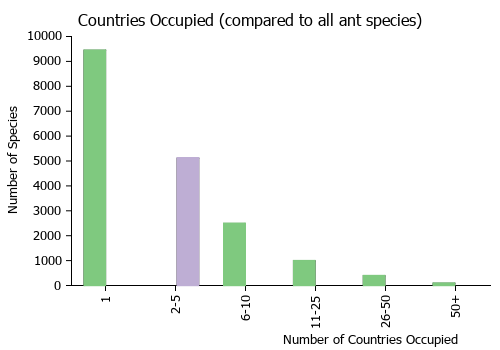Pheidole noar
| Pheidole noar | |
|---|---|

| |
| Scientific classification | |
| Kingdom: | Animalia |
| Phylum: | Arthropoda |
| Class: | Insecta |
| Order: | Hymenoptera |
| Family: | Formicidae |
| Subfamily: | Myrmicinae |
| Tribe: | Attini |
| Genus: | Pheidole |
| Species: | P. noar |
| Binomial name | |
| Pheidole noar Wilson, 2003 | |
Discovered by Philip S. Ward foraging on the ground in the Cabo Rojo coastal desert. Its pale color suggests that this surprising species is probably nocturnal. A male was collected with the type colony (9 September). (Wilson 2003)
Identification
See the description in the nomenclature section.
Keys including this Species
Distribution
Only known from the type locality.
Latitudinal Distribution Pattern
Latitudinal Range: 17.90833333° to 17.9°.
| North Temperate |
North Subtropical |
Tropical | South Subtropical |
South Temperate |
- Source: AntMaps
Distribution based on Regional Taxon Lists
Neotropical Region: Dominican Republic (type locality), Greater Antilles.
Distribution based on AntMaps
Distribution based on AntWeb specimens
Check data from AntWeb
Countries Occupied
| Number of countries occupied by this species based on AntWiki Regional Taxon Lists. In general, fewer countries occupied indicates a narrower range, while more countries indicates a more widespread species. |

|
Estimated Abundance
| Relative abundance based on number of AntMaps records per species (this species within the purple bar). Fewer records (to the left) indicates a less abundant/encountered species while more records (to the right) indicates more abundant/encountered species. |

|
Biology
Castes
Worker
minor
   
| |
| . | |
Nomenclature
The following information is derived from Barry Bolton's Online Catalogue of the Ants of the World.
- noar. Pheidole noar Wilson, 2003: 210, figs. (s.w.) DOMINICAN REPUBLIC.
Unless otherwise noted the text for the remainder of this section is reported from the publication that includes the original description.
Description
A member of the diligens group, somewhat similar to Pheidole accinota, Pheidole alpestris and Pheidole cameroni of South America, but very distinct from these and other species of the group in the following combination of traits.
Major: body concolorous yellow, appendages pale yellow; eye pear-shaped, coming to a small point at its anterior edge; propodeal spine half as long as the basal propodeal face; body almost entirely smooth and shiny.
Minor: pale yellow; propodeal spine thin, needle-like; humerus in dorsal-oblique view denticulate; body almost completely smooth and shiny; carinulae completely absent from head and body, including antennal fossae.
MEASUREMENTS (mm) Holotype major: HW 1.04, HL 1.10, SL 0.70, EL 0.20, PW 0.50. Paratype minor: HW 0.42, HL 0.48, SL 0.60, EL 0.10, PW 0.28.
COLOR Major: concolorous yellow, mandibles brownish yellow, other appendages pale yellow.
Minor: body and appendages concolorous pale yellow.
Figure. Upper: holotype, major. Lower: paratype, minor. Scale bars = 1 mm.
Type Material
DOMINICAN REPUBLIC: Cabo Rojo, 17°54'N 71°40'W, 5 m, col. Philip S. Ward. Museum of Comparative Zoology
Etymology
Gr noar, phantom.
References
- Wilson, E. O. 2003. Pheidole in the New World: A dominant, hyperdiverse ant genus. Harvard University Press, Cambridge, MA. (page 210, fig. major, minor described)
- Lubertazzi, D. 2019. The ants of Hispaniola. Bulletin of the Museum of Comparative Zoology, 162(2), 59-210 (doi:10.3099/mcz-43.1).
References based on Global Ant Biodiversity Informatics
- Perez-Gelabert D. E. 2008. Arthropods of Hispaniola (Dominican Republic and Haiti): A checklist and bibliography. Zootaxa 1831:1-530.
- Wilson, E.O. 2003. Pheidole in the New World: A Dominant, Hyperdiverse Genus. Harvard University Press


